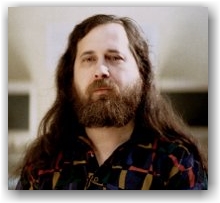
Direct download as Ogg (8:51, 3.5 MB)
Summary: The third part of our interviews series with Richard Stallman covers privacy in communication
In this third part we turn our attention to more political issues. I spoke to Richard Stallman about matters of privacy as he has in-depth knowledge of the facts. Here is the transcript.
Dr. Roy Schestowitz: My next question is more about surveillance because I don’t want it to be strictly about software because I know you do have the digital freedom in general and I want you to ask you about advice for trying to avert surveillance in this age where, based on the whistleblowers, we know the NSA is in fact recording vast amounts of information and data about people and also recording all the E-mails. What is your suggestion to people who try to avoid all of that?
 Dr. Richard Stallman: Well, I think it’s our duty to avoid that. It’s every citizen’s duty to stick a finger in Big Brother’s eye. Now, the NSA would like us to believe that it’s doing the surveillance to protect us Americans from the terrorism, but the US regulatory accuses dissidents of being terrorists. So whenever a government says it’s fighting “terrorists” read “dissidents”. And when you look at where the danger around the world comes from, to a large extent it comes from the US. The US was behind — or carried out — a war of aggression in Iraq, a war conquest and then an occupation; as a result hundreds of thousands of Iraqis were killed. The usual figure is definitely an underestimate.
Dr. Richard Stallman: Well, I think it’s our duty to avoid that. It’s every citizen’s duty to stick a finger in Big Brother’s eye. Now, the NSA would like us to believe that it’s doing the surveillance to protect us Americans from the terrorism, but the US regulatory accuses dissidents of being terrorists. So whenever a government says it’s fighting “terrorists” read “dissidents”. And when you look at where the danger around the world comes from, to a large extent it comes from the US. The US was behind — or carried out — a war of aggression in Iraq, a war conquest and then an occupation; as a result hundreds of thousands of Iraqis were killed. The usual figure is definitely an underestimate.
And so, really you gotta ask, who does the world need protecting from? And this is not — not to count — countries which are dictatorships that are propped up by the US, which carry out the worst kinds of atrocities but they are useful allies to the US, so the US protects them, such as Ethiopia and now Honduras. Honduras had a military coup which might have been organised by the US, but in any case it has certainly been given full support by the US since.
So, I just don’t think of that argument as valid at all. I don’t think that the NSA is on the side of the good people in the world. And so I think that it’s perfectly appropriate to do things like using Tor — and using encryption — to interfere with the NSA’a ability find out what you’re doing.
And I want to also ask you, what’s your advice about the use of mobile phones especially now that we know, at least based on Sprint, that the carriers, at least in the United States and we know here in the UK as well, are in fact collecting data on location of people, the people they phone, perhaps the address books as well. What would you say to people?
I don’t have mobile phone.
I know.
And why… it’s because mobile phones are Stalin’s dream. They are surveillance and tracking devices. They are always sending the location frequently (I think even if you don’t make a call), so your whole life is being tracked and of course if you do make a call, the system knows who you call. And now only that, most mobile phones have a universal back door, meaning that the phone company — you or someone else — can forcibly install software changes without asking your permission. This has been used to remotely convert phones into listening devices, and when that is done the phone picks up and transmits all the conversations in the vicinity whether you’re making a call or not and transmits it to someone and just pushing the button to switch it off does not necessarily really do that. So I consider this outrageous and I won’t have one. If I’m travelling around somewhere and I need to make a call I ask somebody nearby to let me make a call. That way, Big Brother doesn’t get information about me.
More insights from Stallman are to be published in the coming days.
We hope you will join us for future shows and consider subscribing to the show via the RSS feed. You can also visit our archives for past shows. If you have an Identi.ca account, consider subscribing to TechBytes in order to keep up to date.
As embedded (HTML5):
Keywords: NSA privacy fsf gnu spying
Download:

